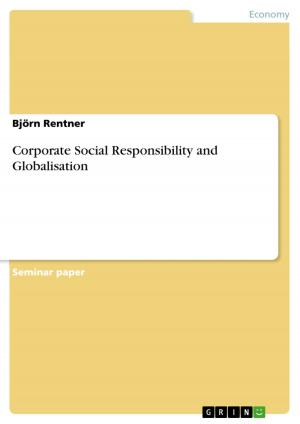| Author: | Matthias Meier | ISBN: | 9783638829854 |
| Publisher: | GRIN Publishing | Publication: | July 19, 2007 |
| Imprint: | GRIN Publishing | Language: | English |
| Author: | Matthias Meier |
| ISBN: | 9783638829854 |
| Publisher: | GRIN Publishing |
| Publication: | July 19, 2007 |
| Imprint: | GRIN Publishing |
| Language: | English |
Seminar paper from the year 2006 in the subject Business economics - Personnel and Organisation, grade: 1,3, University of Westminster (University of Westminster), course: Human Resource Management in the Global Environment, 15 entries in the bibliography, language: English, abstract: In general, most of Multinational Corporations (MNCs) with worldwide operations face the same problem of standardisation vs. customisation. On the one hand, MNCs have to meet the need for reaping scale economies and cost reductions and on the other hand they have to be close to the customer and locally responsive to different cultures and tastes which usually raise costs. When it comes to human resource management (HRM), the question arises whether to transfer and apply centrally developed HRM policies and practices in all its operations or to delegate decision making authority to the subsidiaries enabling them to develop entirely decentralised approaches. A hybrid approach can be chosen by implementing central HRM policies that can be applied consistently worldwide and to give responsibility to its subsidiaries in e.g. culture sensitive areas which have to be adjusted to local circumstances. This assignment focuses on training and development issues of a multinational manufacturing company with subsidiaries in 12 countries worldwide and 3,600 employees. It proposes areas where policies should be developed centrally and explains why it should be the central management's responsibility (Chapter 2). Chapter 3 recommends a way to introduce and to manage adherence to the principles of a centrally developed training policy.
Seminar paper from the year 2006 in the subject Business economics - Personnel and Organisation, grade: 1,3, University of Westminster (University of Westminster), course: Human Resource Management in the Global Environment, 15 entries in the bibliography, language: English, abstract: In general, most of Multinational Corporations (MNCs) with worldwide operations face the same problem of standardisation vs. customisation. On the one hand, MNCs have to meet the need for reaping scale economies and cost reductions and on the other hand they have to be close to the customer and locally responsive to different cultures and tastes which usually raise costs. When it comes to human resource management (HRM), the question arises whether to transfer and apply centrally developed HRM policies and practices in all its operations or to delegate decision making authority to the subsidiaries enabling them to develop entirely decentralised approaches. A hybrid approach can be chosen by implementing central HRM policies that can be applied consistently worldwide and to give responsibility to its subsidiaries in e.g. culture sensitive areas which have to be adjusted to local circumstances. This assignment focuses on training and development issues of a multinational manufacturing company with subsidiaries in 12 countries worldwide and 3,600 employees. It proposes areas where policies should be developed centrally and explains why it should be the central management's responsibility (Chapter 2). Chapter 3 recommends a way to introduce and to manage adherence to the principles of a centrally developed training policy.















